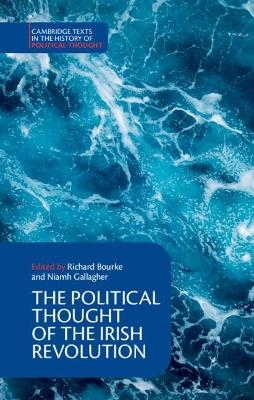
The Political Thought of the Irish Revolution
Cambridge University Press (Verlag)
978-1-108-79913-3 (ISBN)
The Irish Revolution was a pivotal moment of transition for Ireland, the United Kingdom, and British Empire. A constitutional crisis that crystallised in 1912 electrified opinion in Ireland whilst dividing politics at Westminster. Instead of settling these differences, the advent of the First World War led to the emergence of new antagonisms. Republican insurrection was followed by a struggle for independence along with the partition of the island. This volume assembles some of the key contributions to the intellectual debates that took place in the midst of these changes and displays the vital ideas developed by the men and women who made the Irish Revolution, as well as those who opposed it. Through these fundamental texts, we see Irish experiences in comparative European and international contexts, and how the revolution challenged the durability of Britain as a global power.
Richard Bourke is Professor of the History of Political Thought and a Fellow of King's College at the University of Cambridge. His books include Peace in Ireland: The War of Ideas (2nd ed. 2012) and Empire and Revolution: The Political Thought of Edmund Burke (2016), which was joint winner of the István Hont Memorial Book Prize in Intellectual History in 2016. His work has been named a Book of the Year in The Observer, The Irish Times, The Spectator, The Claremont Review of Books, RTÉ, The Indian Express, and The National Review. He is co-editor of the Princeton History of Modern Ireland (2016) which was selected as a Choice Outstanding Academic Title. Niamh Gallagher is Lecturer in Modern British and Irish History and a Fellow of St Catharine's College at the University of Cambridge. Her first book, Ireland and the Great War: A Social and Political History (2019), won the Royal Historical Society's Whitfield Prize in 2020, the first work of Irish history to win the prize since its establishment in 1976. She has since published on the cultural, political and social history of the First World War and other aspects of Irish and British History, and appears regularly in the UK, Irish and international media.
Acknowledgements; Introduction Richard Bourke; Bibliographical Essay; Chronology of Events; Biographies; Note on the Texts; 1909: 1. Women, Ideals and the Nation Constance Markievicz; 1910: 2. From Labour in Irish history James Connolly; 1911: 3. From 'Pitt's Policy' Arthur Griffith; 4. From the Framework of Home Rule Erskine Childers; 1912: 5. 'Home Rule and the Colonial Analogy' L. S. Amery; 6. 'Settlement of an Old Controversy' Edward Carson; 7. Ulster's Solemn League and Covenant; 8. Ulster's Solemn League and Covenant (Women's Declaration); 9. 'The Economics of Nationalism' Thomas M. Kettle; 1913: 10. From A Fool's Paradise A.V. Dicey; 11. 'The North Began' Eoin MacNeill; 12. The Coming Revolution Patrick Pearse; 1914: 'Labour and the Proposed Partition of Ireland' James Connolly; 14. 'Our Duty in the Crisis' James Connolly; 15. 'A Continental Revolution' James Connolly; 16. 'Speech on the Suspensory Bill' John Redmond; 1915: 17. 'A War for Civilization' James Connolly; 18. From the Re-conquest of Ireland James Connolly; 19. 'O'Donovan Rossa: Graveside Panegyric' Patrick Pearse; 1916: 20. 'What is a Free Nation?' James Connolly; 21. Proclamation of the Republic: Poblacht na h Éireann; 22. The Sovereign People Patrick Pearse; 1917: 23. 'State of Ireland' Hanna Sheehy Skeffington; 24. A Defence of the Convention Horace Plunkett; 1918: 25. Ireland and a People's Peace Louie Bennett; 26. Loyalty and Disloyalty: What it Means in Ireland Alice Stopford Green; 27. Ourselves Alone in Ulster Alice Stopford Green; 1920: 28. 'Ulster the Facts of the Case' Robert Lynd; 1921: 29. Is Ireland a Danger to England? Erskine Childers; 30. 'Debate on Treaty' Arthur Griffith; 1922: 31. From Ulster's Stand for Union Ronald McNeill; Index.
| Erscheinungsdatum | 27.04.2022 |
|---|---|
| Reihe/Serie | Cambridge Texts in the History of Political Thought |
| Zusatzinfo | Worked examples or Exercises |
| Verlagsort | Cambridge |
| Sprache | englisch |
| Maße | 138 x 215 mm |
| Gewicht | 575 g |
| Themenwelt | Geisteswissenschaften ► Geschichte ► Regional- / Ländergeschichte |
| Geisteswissenschaften ► Philosophie ► Philosophie der Neuzeit | |
| Sozialwissenschaften ► Politik / Verwaltung ► Politische Theorie | |
| ISBN-10 | 1-108-79913-2 / 1108799132 |
| ISBN-13 | 978-1-108-79913-3 / 9781108799133 |
| Zustand | Neuware |
| Informationen gemäß Produktsicherheitsverordnung (GPSR) | |
| Haben Sie eine Frage zum Produkt? |
aus dem Bereich


